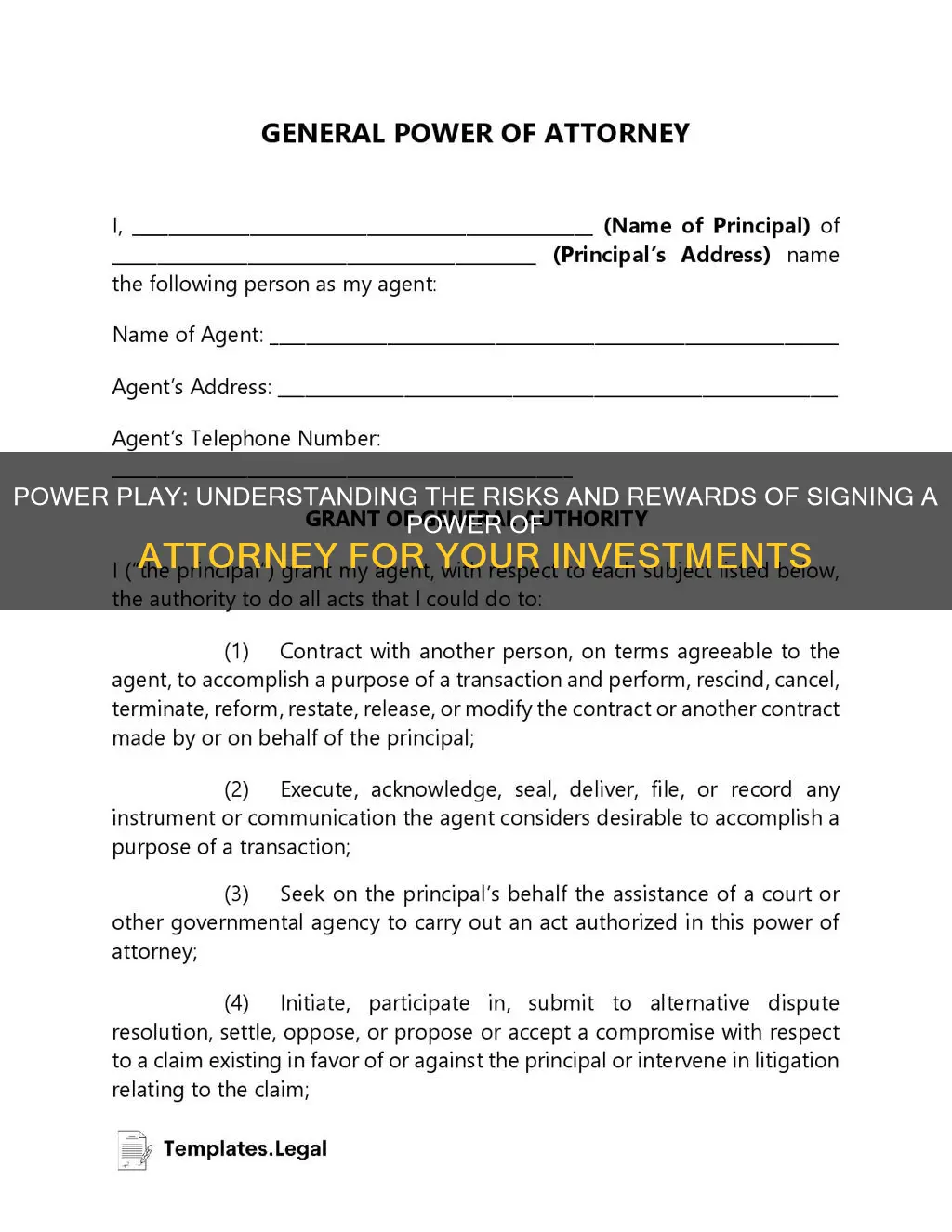
A power of attorney (POA) is a legal document that grants someone the authority to sign documents and conduct transactions on another person's behalf. The person who holds the POA is called the agent or attorney-in-fact, while the person who grants the POA is called the principal. The agent can be given broad or limited authority to make decisions about the principal's property, finances, investments, or medical care. A POA can be a helpful way to prepare for the future, especially if you become incapacitated and need someone to manage your affairs. However, it is important to exercise caution when granting someone this level of authority and to understand the applicable laws in your state or province.
| Characteristics | Values |
|---|---|
| What is a power of attorney? | A legal document that gives someone the authority to sign documents and conduct transactions on another person's behalf. |
| Who can be a power of attorney? | Anyone you trust, such as a spouse, close friend, family member, or a professional like a lawyer, accountant, or banker. |
| When to get a power of attorney? | When you want to prepare for the future and ensure your financial affairs are managed if something happens to you. |
| Types of power of attorney | Financial power of attorney, Health Care Power of Attorney (HCPOA), Durable Power of Attorney (DPOA), Springing Power of Attorney, General Power of Attorney, Limited Power of Attorney. |
| How to sign as a power of attorney? | Sign the principal's full legal name, then write "by", and then sign your name. You can also add "Agent", "Attorney in Fact", "Power of Attorney", or "POA" after your signature. |
| Requirements for a power of attorney | Requirements vary by state or territory, but generally include being mentally competent, having the document witnessed, and notarization. |
| Revoking a power of attorney | You can revoke a power of attorney at any time by writing a letter and delivering it to the agent. |
What You'll Learn

Understanding the role of an attorney-in-fact
Who is an Attorney-in-Fact?
An attorney-in-fact, also known as an "agent," is a person authorized to act and make decisions on behalf of another individual, known as the "principal." The attorney-in-fact is typically appointed by the principal through a legal document called a power of attorney (POA). This authorization allows the attorney-in-fact to perform various tasks, such as signing legal documents, managing finances, or making medical decisions for the principal. It's important to note that an attorney-in-fact is not necessarily a lawyer and doesn't require any specific qualifications. They can be a family member, a close friend, or any competent adult the principal trusts.
The Role and Responsibilities of an Attorney-in-Fact:
The attorney-in-fact has a fiduciary duty to always act in the best interests of the principal. They must follow the instructions and guidelines set forth in the power of attorney document. The responsibilities of an attorney-in-fact can include a wide range of tasks, such as:
- Managing finances, including bank accounts, investments, and financial transactions.
- Paying bills and taxes.
- Making medical decisions if the principal becomes incapacitated.
- Managing the principal's business affairs.
- Handling the principal's property and real estate matters.
- Representing the principal in court or legal proceedings.
- Maintaining confidentiality and keeping records of actions taken on the principal's behalf.
Revoking the Power of Attorney:
It's important to choose an attorney-in-fact carefully, as it involves trusting someone with important decisions that can significantly impact your life. If needed, the principal can revoke the power of attorney by providing a clear, written, and notarized declaration. This process may vary depending on the state and the specific circumstances.
In summary, an attorney-in-fact plays a crucial role in acting and making decisions on behalf of the principal. It is a position of trust and responsibility, requiring the attorney-in-fact to always act in the principal's best interests and within the scope of the power of attorney granted to them.
Oil Investment Calls: Why Me?
You may want to see also

The types of power of attorney
A power of attorney (POA) is a legal document that allows someone else to make decisions on your behalf, acting as your agent. This can be especially important in unexpected situations where you might be unable to manage your affairs or make crucial decisions.
There are four main types of power of attorney: Limited, General, Durable, and Springing.
Limited Power of Attorney
A limited POA grants someone the authority to act on your behalf for a specific purpose and for a specified time. This type of POA ends once the task is completed or after a certain date. For example, if you're going to be out of the country, you can draft a limited POA to let someone sign for you at a real estate closing.
General Power of Attorney
A general POA provides a broader scope of authority, enabling someone to handle nearly all your affairs. This type of POA is useful when you need someone to manage your financial matters comprehensively. A general POA remains in effect until you revoke it, you become incapacitated, or you pass away.
Durable Power of Attorney
The key difference between a general and durable POA is that the durable POA remains effective even if you become incapacitated. This type of POA ensures your agent can continue to act on your behalf if you are unable to do so. For instance, if you have been diagnosed with a disease that affects your mental capacity, a durable POA would allow your agent to manage your affairs once you are no longer capable.
Springing Power of Attorney
A springing POA only takes effect upon the occurrence of a specific event, such as incapacitation. It's crucial to clearly define what will trigger the POA in this document. For example, if you are scheduled for overseas deployment and duties that may place you in a situation where you become incapacitated, a springing POA can stipulate that your designated sibling can act on your behalf.
In addition to these four main types, it's worth noting that POAs can also be financial or healthcare-related. Financial POAs allow an agent to manage the principal's business and financial affairs, such as signing checks, filing tax returns, and managing investment accounts. On the other hand, a healthcare power of attorney allows someone to make medical decisions on your behalf if you are unable to do so.
Invest Early: Compounding Returns
You may want to see also

Choosing an attorney
- Proximity: It is advisable to choose an attorney who lives close by as they will need to be able to reach you quickly in case of emergencies.
- Trustworthiness: The attorney will be handling important financial and medical matters, so it is crucial to select someone trustworthy and reliable.
- Understanding of Medical Terms and Conditions: The attorney should have a good understanding of medical terminology and your specific medical conditions to make informed decisions.
- Assertiveness: Look for someone who can remain calm and assertive under pressure, especially when dealing with emotional situations or differing opinions from family members.
- Willingness to Serve: Being an attorney is a demanding role, so ensure the person is willing and able to dedicate themselves to the task.
- Responsibility: The attorney will have access to your confidential records and will be making crucial decisions. Choose someone responsible and capable of handling these responsibilities with discretion.
- Legal Requirements: The attorney must be an adult with the mental capacity to make their own decisions. Consult a lawyer to understand any specific legal requirements in your area.
- Number of Attorneys: While you can choose more than one attorney, it is generally recommended to select a single person to avoid potential disagreements and delays in decision-making.
When choosing an attorney, consider their characteristics and how well they align with your needs and preferences. It is essential to have open and honest discussions with your potential candidates, ensuring they understand your wishes and are willing to act in your best interests.
Retirement Investing: Navigating the Kiplinger Way
You may want to see also

Signing as a power of attorney
When signing as a power of attorney, you must clearly indicate that you are signing on the principal's behalf. The proper way to do this is to first sign the principal's full legal name, then write "by", and then sign your name. You can also indicate your role by adding "Agent", "Attorney-in-Fact", "Power of Attorney", or "POA" after your signature. For example:
"Sam Jones, by Catherine Spalding, agent"
"Richard Smith, by Megan Smith, attorney-in-fact"
It is important to always carry your copy of the POA document with you when conducting business on behalf of the principal, as well as a form of photo identification. Before signing, it is a good idea to ask if there is a preferred format for your signature, as some institutions may have specific requirements.
As a power of attorney, you have a fiduciary duty to act in the best interests of the principal and to manage their affairs prudently and fairly. You must not exceed your authority as outlined in the POA document, and it is important to consult a lawyer if you have any questions or concerns about your responsibilities and authority.
Retirement Planning: Overcoming Investment Inertia
You may want to see also

Revoking a power of attorney
A power of attorney is a legal document that allows you to appoint an individual or individuals to represent you or make decisions on your behalf. You can revoke or terminate your power of attorney at any time and for any reason, as long as you are of sound mind. If you are no longer of sound mind, a court can remove an agent for acting improperly.
To revoke your power of attorney, you must do so in writing and inform banks and other institutions that may have relied on your power of attorney before you revoked it. You should also ensure that your agent receives written notice, such as an email, that their authority has been revoked. If you don't have a copy of your previously filed power of attorney, you should send a statement of revocation that identifies the power of attorney you wish to revoke and states that it is no longer in effect. You must sign and date this statement and include your name, address, and taxpayer ID number, as well as the name and address of each previously appointed representative whose authority you want to revoke.
It is important to note that if you have appointed multiple individuals on one power of attorney, you cannot revoke the authority of just one of the individuals. Revoking the authority of any of the representatives will revoke the power of attorney for all representatives listed, and you will need to file a new power of attorney for any representatives you want to retain.
Additionally, if you have appointed multiple individuals on one power of attorney and one of them withdraws, your power of attorney will become invalid, and you will need to file a new one for the representatives you want to retain.
Theranos Investors: Medical Backgrounds?
You may want to see also
Frequently asked questions
A power of attorney (POA) is a legal document that gives someone else the authority to make decisions and act on your behalf. The person who receives this authority is called the agent or attorney-in-fact, and they can be given broad or limited powers to manage your property, finances, investments, or medical care.
You can choose anyone to be your power of attorney, but it is important to select someone you trust, such as a spouse, close friend, or family member. The person does not need to be a lawyer, but they must be competent and capable of handling the responsibilities that come with the role.
When signing as a power of attorney, you must clearly indicate that you are signing on behalf of the principal (the person who granted you the power of attorney). The proper way to sign is to first write the principal's full legal name, then "by", and then sign your own name. You can also add "Agent", "Attorney in Fact", "Power of Attorney", or "POA" after your signature. For example: "Principal's Name, by Agent's Name, POA".







